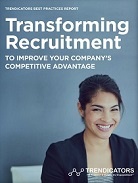
Engagement is critical to organizational performance, retention and competitive advantage. It represents a measurable and influenceable aspect of business success, yet many organizations lack enterprise-wide strategies and accountability to optimize engagement efforts.
Our latest report, Improving Engagement Across the Talent Lifecycle, explores benefits, challenges and best practices for improving engagement from pre-hire to retirement.
Engagement is not merely a business metric; it fuels discretionary effort, directly impacting retention, performance and customer satisfaction. Despite significant investments in engagement surveys and recognition programs, organizations struggle to achieve measurable improvements due to siloed responsibilities and insufficient accountability frameworks.
We recently completed an Engagement Strategy Benchmarking Survey where 78 HR and talent management leaders were asked to assess engagement practices across the talent lifecycle. Findings reveal:
- Widespread Investment but Limited ROI: Over 75% of employers conduct engagement surveys and invest in recognition programs, yet these tools often lack the follow-up needed to drive meaningful change.
- Strategic Gaps: More than half of respondents need a written engagement strategy, and 86% report no single executive accountable for organizational engagement.
- Managerial Impact: Managers significantly influence engagement, yet most need more training to develop these skills.
The survey also highlighted several barriers to improving engagement:
1. Fragmented Responsibility: Engagement efforts are often divided across departments, leading to inconsistent candidate and employee experiences.
2. Inadequate Follow-Through: Collecting feedback without actionable responses exacerbates disengagement.
3. Lack of Manager Accountability: While managers are central to engagement, HR needs more authority to enforce accountability.Engagement begins with candidate interactions and continues through employment. Pre-hire engagement, such as respect and appreciation during interviews, strongly impacts hiring outcomes. Once onboarded, employees' perceptions of their managers shape performance, satisfaction and retention. However, engagement strategies often need to address these critical touchpoints holistically.
Managers are key to translating organizational engagement initiatives into personal employee experiences. Effective engagement requires:
- Understanding Individual Needs: Managers must recognize what motivates each team member.
- Training and Accountability: Traditional training models, often brief and disconnected from outcomes, must equip managers with actionable skills. Programs must integrate diagnostic insights, personalized action plans, and follow-up to ensure behavioral changes.
Based on survey insights and expert recommendations, organizations can improve engagement by:
1. Developing an Enterprise-Wide Strategy: Establish a comprehensive framework to measure, manage and enhance engagement across all stages of the talent lifecycle.
2. Aligning with C-Suite Objectives: Securing executive sponsorship and translating engagement metrics into key performance indicators (KPIs) valued by leadership is essential for gaining support.
3. Empowering Managers: Equip managers with tools and accountability mechanisms to act on feedback, improve engagement behaviors and foster trust.
4. Prioritizing Candidate Engagement: Demonstrating respect, appreciation and effective communication during hiring enhances organizational reputation and success.
While most organizations recognize the business value of engagement, significant gaps remain in strategy, execution and accountability. By adopting a holistic approach that integrates engagement initiatives across the talent lifecycle and prioritizes managerial development, companies can maximize the ROI of engagement programs and drive sustained competitive advantage.
To read more on this topic, download the full report Improving Engagement Across the Talent Lifecycle below!



